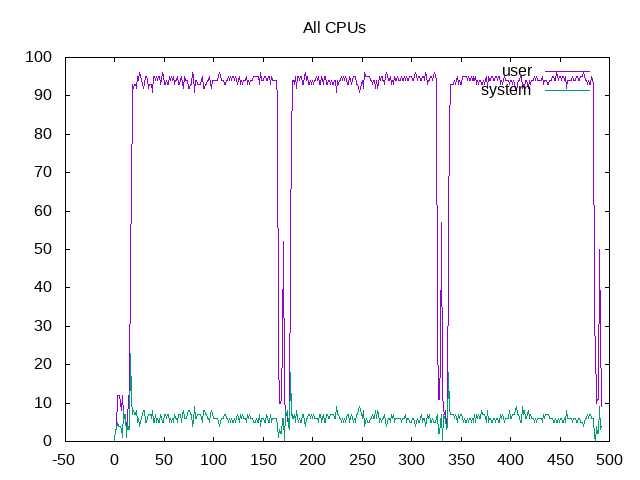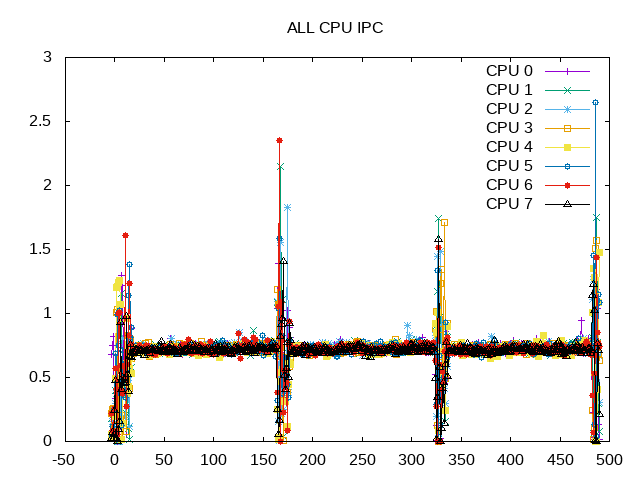This test times how long it takes to build the Linux kernel.
In particular, the test does a “make” against sources for the Linux 4.13 kernel.
Metrics (Intel) - phoronix/build-linux-kernel
sh - pid 30550 On_CPU 0.875 On_Core 6.996 IPC 0.728 Retire 0.362 (36.2%) FrontEnd 0.431 (43.1%) Spec 0.114 (11.4%) Backend 0.094 (9.4%) Elapsed 160.12 Procs 29135 Minflt 31486712 Majflt 1 Utime 1078.81 (96.3%) Stime 41.44 (3.7%) Start 403802.45 Finish 403962.57
Several things to observe from the overall metrics:
- On my system, the workload is ~87.5% On_CPU. For a build application like this, there are two likely sources for time not on the CPU: (1) parts of the built that are not parallel. If this were the case, plotting the On_CPU metric over time might have periods of high spots e.g. parallel compiles and low spots e.g. serialized link steps. Examination of the workload and the plot below say this is not the case. This is in contrast to a workload like build-gcc and (2) time spent in I/O such as reading/writing to the disk. The resource stats below will give additional clues.
- This workload has a higher percentage of frontend stalls as compared to other workloads. This suggests deeper investigations into icaches, TLBs, etc are likely a factor for lower IPC. A slightly high bad speculation is also a potential factor for a somewhat lower IPC.

time-compile-ke - pid 714 On_CPU 0.809 On_Core 12.940 IPC 0.708 FrontCyc 0.110 (11.0%) BackCyc 0.109 (10.9%) Elapsed 98.12 Procs 29143 Minflt 31542640 Majflt 1 Utime 1212.23 (95.5%) Stime 57.45 (4.5%) Start 55562.70 Finish 55660.82
Comparing the metrics with my AMD system, the On_CPU percentage is slightly lower. This reflects the parallel in-core aspects becoming less dominant than either non-parallel parts of the application or disk I/O; i.e. compiles speed up and disk I/O and parallel link becomes a larger proportion.
The number of processes in these builds is just slightly different between AMD/Intel runs (29135 vs. 29143) but not sure if I might have missed a few in the tool or the environment causes slightly different builds to happen. More significant on both platforms is when the benchmark runs the workload three times, the number of processes is a fair amount higher in the first run as the second and third:
benchmark run #1 has 29135 processes benchmark run #2 has 26129 processes benchmark run #3 has 26093 processes
I believe the most likely cause is that the benchmark didn’t quite do a thorough “clean” between successive invocations of make(1) and hence different work gets done in the three iterations. This is true on both AMD and Intel and an “average” is reported, so more an interesting artifact of the benchmark than a different that affects the comparison.
utime: 3393.401616 stime: 214.175804 maxrss: 198K minflt: 95081555 majflt: 47 nswap: 0 inblock: 314304 oublock: 4058656 msgsnd: 0 msgrcv: 0 nsignals: 0 nvcsw: 357645 nivcsw: 559795
The resource metrics show considerable amounts of I/O with a lot more blocks written than read. It also shows voluntary context switches (e.g. process paused on an I/O read) as a reasonable proportion of involuntary context switches (e.g. time slice expired). Not sure I trust the “maxrss” value that comes from getrusage(2) call I made for this report (methodology used).
Process Tree - phoronix/build-linux-kernel
Process Tree
The process tree file is large, so let me summarize a count of how many of each process are found:
4571 sh
3554 bash
3188 rm
2662 gcc
2570 as
2539 cc1
2396 mv
2386 fixdep
1614 cat
986 tr
977 make
601 ar
511 sed
248 wc
70 ld
45 grep
39 collect2
16 pnmtologo
14 mkdir
12 sort
12 pkg-config
12 objcopy
10 readelf
9 nm
9 getconf
7 tail
7 basename
6 uname
6 find
6 cut
3 xargs
3 relocs
3 awk
2 whoami
2 vdso2c
2 stat
2 objdump
2 modpost
2 mktemp
2 kallsyms
2 hostname
2 git
2 expr
2 date
2 cmp
1 uniq
1 touch
1 time-compile-ke
1 svn
1 sortextable
1 perl
1 mkpiggy
1 mk_elfconfig
1 mkcpustr
1 ln
1 gzip
1 gen_init_cpio
1 genheaders
1 gen_crc32table
1 dirname
1 conmakehash
1 conf
1 build
1 bc
 About this graph
About this graph
Overall, the cores are being kept busy within a 90% plus range.

Ignore the spikes between workloads and the IPC is surprisingly constant across these ~29,000 process invocations.
 About this graph
About this graph
Front end stalls are particularly high compared with other workloads. Speculation is also slightly higher.
Next steps: Deeper dives into front end issues looking at iTLB, iCache, etc.
